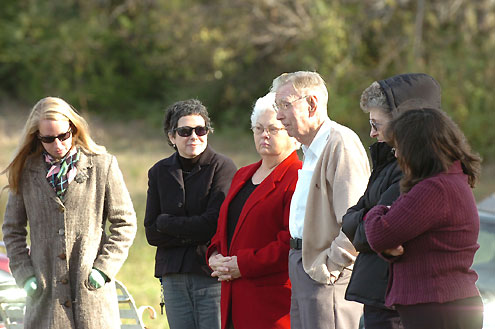 |
Lifestyles
Quiet ceremony commemorates anniversary of the passing of Sam Rayburn
By Allen Rich
Dec 17, 2007
It was a solemn ceremony in Bonham, a gathering of less than a dozen at Willow Wild Cemetery, and a marked contrast from the day 46 years ago when the town's population suddenly swelled to approximately 30,000 as the world bid farewell to Sam Rayburn, the 48th, 50th and 52nd Speaker of the U.S. House of Representatives.

Sam Rayburn's funeral remains one of the most memorable and historical gatherings held outside the Washington, D.C. area in all of America's storied past. The crowd outside First Baptist Church in Bonham, estimated at close to 20,000 people, listened on loudspeakers. Inside were four men who would at one time hold our nation's highest office; the sitting President, John Kennedy, former Presidents Harry Truman and Dwight Eisenhower, along with Vice-President Lyndon Johnson, the man would become President on another sad November day two years later, and all listened to a remarkable eulogy given by Elder Grady Ball, a 74-year-old grocer and preacher that presided over the Primitive Baptist Church in Tioga, Texas.
There were also 128 members of the House and Senate attending the service. Coordinating security as well as accommodating the timeline of the national media that converged on Bonham meant a strict schedule must be adhered to precisely. It was a paradox that the man in charge of this momentous occasion never had a congregation of over four dozen members.
H.G. Dulaney, an Ector, Texas native that Speaker Rayburn hired to work on his staff in Washington in 1951 and later sent to Bonham to oversee the development of the Sam Rayburn Library, recalls being asked to explain the necessary time constraints to Elder Ball.
"It really wasn't necessary," Mr. Dulaney said with a shrug. "He just got up there, said what he had to say and sat down."
With a nation's eyes trained on him, the country preacher stepped up to the podium and delivered a touching tribute to the man who dedicated his career to improving the lives of everyone around him. Elder Ball reflected on the vision of the Apostle Paul.
Paul was able to meet the great of the earth or the poor, the noble or the agnostic, and he was able to bring himself in harmony with them and their life so that they might be of service to the classes of men in the world. And so, our good friend made himself a servant, not of the classes but of all the men and women and the boys and the girls and the children who have fought and loved the freedom that our great country affords us. He maintained this out of his energy. Now, he can say, in the language of Apostle Paul in his letter, "I have fought the good fight." In the liberties and freedom of our country, he has fought a good fight. For the friends in this community and all those he represented, he has fought a good fight. He has been a fair and loyal man. He has kept faith, not only with the people of Fannin County, but the adjoining counties. He has kept faith with the democracy of our country. I think it could be truthfully and nobly said, "He has finished his course."
Former President Dwight Eisenhower in Willow Wild Cemetery to attend the burial of former Speaker of the House Sam Rayburn. In the far right stands (l-r) Pat Clutter, Bill Dykes, C.Q. "Frosty" Spiller and Jerry Yarborough. photo courtesy of Sam Rayburn Library Museum
Speaker Rayburn's final resting place is Willow Wild Cemetery, where he was reunited with his parents, family members and friends. Biographer D.B. Hardeman notes that Rayburn's grave was even dug by longtime acquaintance, H.W. Stevenson, who remarked, "This is my last chance to do anything for Mr. Rayburn."
In Rayburn: A Biography, authors D.B. Hardeman and Donald C. Bacon described the significance of the contributions of Elder Ball and H.W. Stevenson with a keen eye.
The words of the world's mighty, whose tributes flowed in from around the globe, had been topped by the simple eloquence of an old country preacher, whose congregation never exceeded forty-five members, and a lonely gravedigger. Rayburn would have been pleased.
At the quiet ceremony held November 16 to commemorate the life and career of Sam Rayburn, H.G. Dulany felt inclined to read the same words Elder Ball spoke at the gravesite on a dreary November day in 1961.
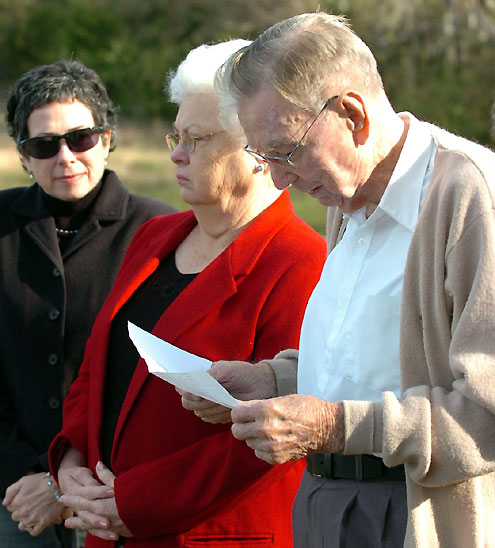
There are few people in the world whose lives have touched the lives of so many. There are few people who have been fortunate enough with health and training to give the compassionate loving kindness to those who were less fortunate than themselves. Such was the life of our good friend, Speaker of the House of our United States.
The poor, the lowly and the less fortunate of life were objects of his consideration and compassion, and many a time they have felt the touch of his kindness, his kindly words and the realization of a faithful and devoted life. Such men are not born; they are made.
It was, indeed, a fortunate few that braved the cold morning wind November 16 to remember the legacy of Speaker Rayburn, particularly fortunate since much of it came from the unique perspective of Dulany, a faithful employee to Rayburn and dear friend to the Rayburn family.
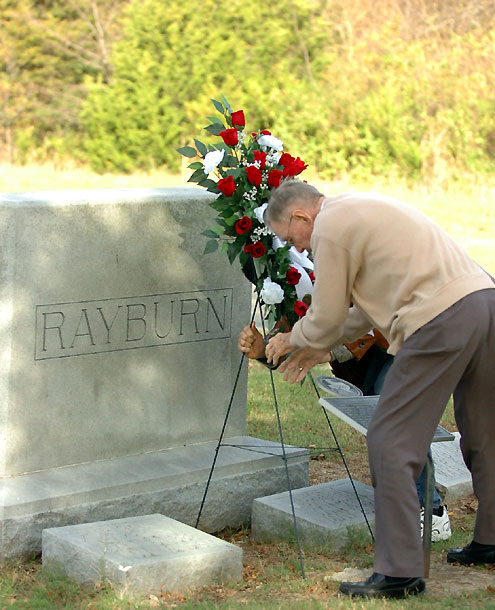
There were solemn moments to recall the ceaseless pain of undiagnosed pancreatic cancer that Rayburn felt would go away if only he could just get home to soak up some Texas sunshine. Even in his final days when all hope was gone, Rayburn somehow held on.
Hardeman found where Rayburn's personal physician in Bonham and friend, Joe Risser, noted on a chart, "This man is not easy to give to Him who has sent for him."
But Dulaney's decades of service to Speaker Rayburn makes the Ector, Texas resident a window into the world that revolved around Sam Rayburn. On Friday, Dulaney dug into his treasure trove and pulled out a story about a trip Rayburn made to Uvalde, Texas to visit with John Nance Garner.
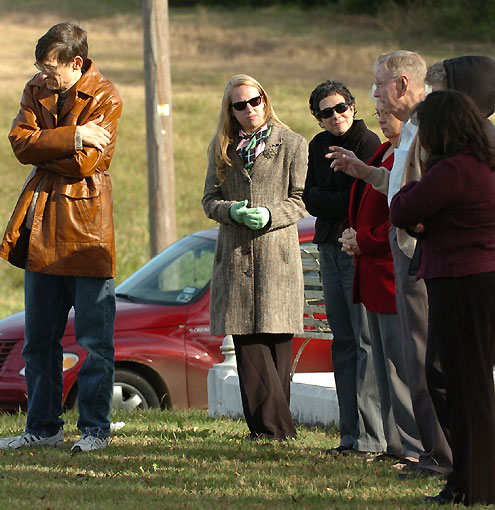
Nicknamed "Cactus Jack" because he felt the cactus would have made a more appropriate and symbolic Texas state flower than the bluebonnet, Garner was born in nearby Red River County. He served as Speaker of the House from 1931-1933 and Garner was Franklin D. Roosevelt's chief rival for the Democratic Presidential nomination in 1932 before eventually serving as FDR's Vice-President from 1933-1941.
Rayburn was in the back seat when his car pulled out of Bonham for the trip to South Texas, with Dulaney and D.B. Hardeman sitting up front.
All went well until Austin where Hardeman, a brilliant man that had already served two terms in the Texas House of Representatives, somehow managed to get lost. The irony wasn't lost on Speaker Rayburn and he couldn't resist having a little fun with the situation.
So here I am, Mr. Rayburn called out from the back seat, in the company of my esteemed colleague, a man that has served two terms in the Texas House of Representatives, and we can't find our way out of Austin.
There's been some construction since I was through here last, Hardeman offered in defense.
After the visit, Rayburn wanted to stop by recently filled Lake Whitney.
"There were just a couple of cabins there at the time," Dulaney remembers, "and we arrived late."
But early the next morning Rayburn was knocking on the door of Dulaney's cabin.
"I want to go fishing," Rayburn announced.
It was 5:00 a.m. on a deserted lake with no one in sight to issue a fishing license, however this time Hardeman came through with flying colors.
"D.B. knew everybody," Dulaney explains, "and he knew the game warden."
Hardeman explained the situation to the local game warden and 30 minutes later Speaker Rayburn is providing the warden with the information required on the fishing license.
"What color is your hair," the game warden asked.
"Brown...when I had any," Rayburn responded.
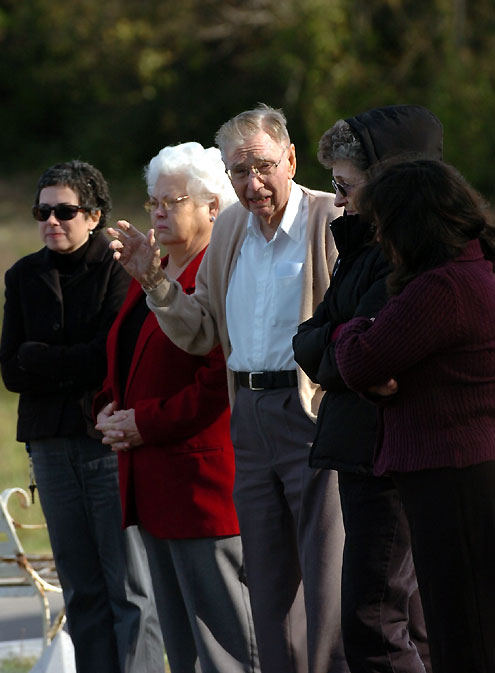
Dulaney flashes his famous grin and laughs at the precious memory.
"I think he was proudest of the Rural Electrification Act," Mr. Dulaney recalled. "He knew what it meant to the people...to his people."
A quote by Sam Rayburn in Speak Mr. Speaker, which was compiled and edited by Edward Hake Phillips and H.G. Dulaney, verified the observation.
Of all the bills I have helped on, I think I am the proudest of being the author of the Rural Electrification Act as it has brought so much good to farm homes throughout our land.
Here are just a few other Rayburn quotes from Speak Mr. Speaker.
I just missed being a tenant farmer by a gnat's whisker.
I remember the long, tedious trip by train from East Tennessee to Fannin County, Texas - a thousand miles or more. I was fascinated by the people I saw on their trek west, all their earthly belongings heaped on covered wagons, men in plainsmen's outfits with wide-brimmed hats and guns on their shoulders, leading the oxen.
I know one thing; if a position changes a person, that person is not big enough for the position. Just mark that down.
The battle for peace and tolerance is never won, but each of us must daily make the best contribution he can toward the task of making all men live together as brothers and as children of God. Toward all the world we have the duty of setting the example of the good neighbor for this role is America's greatest destiny.
I believe there is still some sanity in Washington, although it doesn't come to surface as often as it used to.
I want a government here that will be an example, not only to the people who know and enjoy liberty, but one that will reach into those dark recesses around the earth where people do not know liberty - who have never tasted its fruits.
Oh yes. I own a dress suit, but I haven't eaten as many meals in it as the moths have.
Hate never helped anyone. Hate consumes the soul of the poor individual who allows himself to indulge in the horrible thing.
I have been in politics for nearly forty-two years. Twenty-two times the people of my county have honored me by supporting me. Nineteen times the people of a great congressional district have honored me by choosing me as their spokesman in the greatest legislature upon all this earth. I have achieved my every ambition. 1949, after becoming Speaker again
The people of America must rise or fall together. One segment can't be poor and needy, while the rest is rich and prosperous.
I love the dirt. I like to walk on it. I like to grow things on it. I like to preserve it. Everything comes from the dirt and eventually goes back to the dirt.
I want to go home! I want to end my days among those friends and neighbors who for so long have given me a love and loyalty unsurpassed in any annals.
We the People of the United States, in Order to form a more perfect Union, establish Justice, insure domestic Tranquility, provide for the common defence, promote the general Welfare, and secure the Blessings of Liberty to ourselves and our Posterity, do ordain and establish this Constitution for the United States of America.